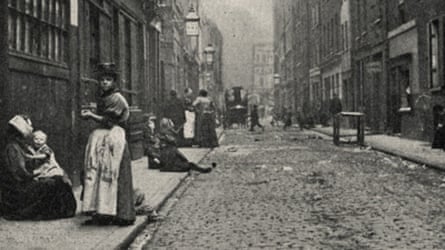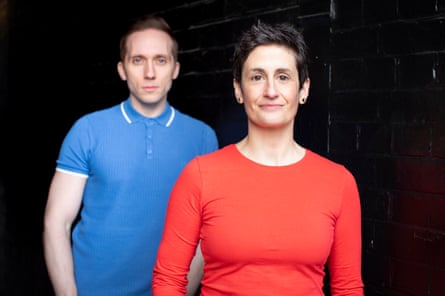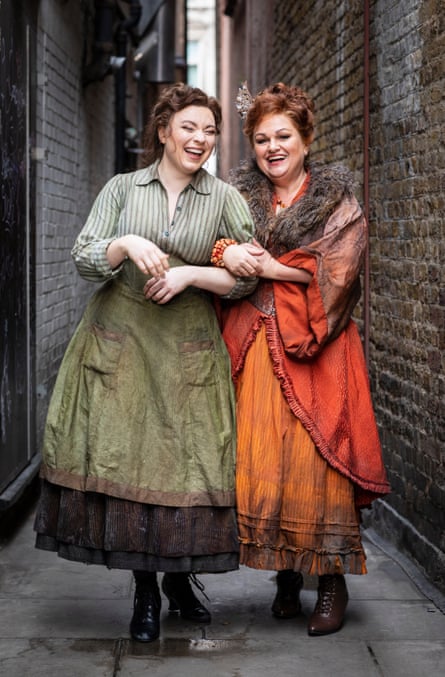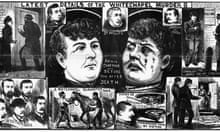You know who Liz Stride was, even if you don’t recognise the name. She was one of five acknowledged victims of the same serial killer in the autumn of 1888; the others were Polly Nichols, Annie Chapman, Catherine Eddowes and Mary Jane Kelly. The killer’s “name” you know: Jack the Ripper. But the names of the women? “They’re answers in a pub quiz,” says composer Iain Bell. “And that’s wrong. I found it beyond injustice that these women were defined solely by the way they died, while their killer was elevated to mythology.”
Bell’s new opera, Jack the Ripper: The Women of Whitechapel, is in part an attempt to redress the balance. It doesn’t feature “Jack” himself on stage at all. Instead the focus is upon the community he struck, and especially the five women, played by a clutch of singers who have long been English National Opera audience favourites — Susan Bullock (who sings Stride), Lesley Garrett, Marie McLaughlin and Janis Kelly — plus rising star Natalya Romaniw. Add Josephine Barstow, taking a break from her role as a nostalgic diva in the National Theatre’s Follies to sing Mary Jane Kelly’s grandmother, and that’s three generations of formidable female opera talent on one stage.
“It’s a lesson in artistry,” says Romaniw, for whom Bullock is something of a mentor. “I’m in with the big shots here.” Bell says he’s been “spoilt rotten” being able to request specific singers whose voices he grew up listening to, and to tailor their roles to them. And so Liz Stride’s big drunk scene ends, as Bullock describes it, with her “popping out the high notes, the Valkyrie stuff. We’ve all got aspects of our music showing off the things that we’re known for.”

Bell is from an East End family himself, and remembers hearing about Jack the Ripper from his grandmother — who had in turn been told the story by her own grandmother, almost as a macabre cautionary tale. When ENO approached him for a commission he knew he wanted to use the story to complete a trilogy of “London operas” alongside A Harlot’s Progress, written to Peter Ackroyd’s libretto and premiered in Vienna in 2013, and A Christmas Carol, a collaboration with Simon Callow staged in Houston in 2014. “But I always wanted it to be about the women,” he says.
When he began work on the piece with librettist Emma Jenkins — also his collaborator on his 2016 opera In Parenthesis — it quickly became clear that the focus needed to be on the women’s lives. Their murders should be left to the music – violent passages rendered, Bell says, “with great sadness”, followed by “mini-Requiems”, emerging from a score tinged with “murky, foggy” cimbalom – rather than shown on stage. The killings are, of course, talked about by the women, but “they speak of other things. They had rich lives. People are strong, and people look for goodness and light and levity in everything.”
A little levity might be just what a full-length opera on this subject needs. Bullock points out that the role of Stride is affording her the opportunity to do something that, with her reputation as a Wagnerian, she isn’t often asked for: comedy. Her scenes often find her paired with Garrett, who plays Eddowes. “A lot of our stuff is ping-pong between each other musically. We get everybody singing in the pub — we try to lift everybody up in this horrible atmosphere.”
A cloud of fear must have hung over Whitechapel during the months the Ripper was active. London was being “turned over”, as Bell puts it, with the Underground under construction. “It must have been like hell on earth,” says Jenkins. “As they were digging they were unearthing the plague pits. Parts of London were huge open holes full of skeletons.” The autumn of the Ripper’s campaign there was a perfect storm of extraordinary and horrific conditions – a drought that meant crops failed brought starving people into the city seeking work and there was poverty and homelessness like never before. Dosshouses often doubled as storerooms for undertakers: fourpence to sleep in a coffin, or tuppence to sleep standing – hung by the armpits over a rope like washing on a line to escape the rats on the floor. The East End streets had no gas lighting, so the Ripper was picking off his victims in the dark, sometimes where they slept.

For Jenkins, the challenge was to fashion a libretto about real-life events when there was so little information about the women to go on. “What we know comes mainly from the coroner’s court transcripts and from newspapers of the time – but those are very contradictory, very biased. And then I stumbled upon the work of WT Stead, the grandfather of investigative journalism. Two years before the murders, he embedded himself in the slums and interviewed hundreds of women and girls, asking how they had got there.”
His findings became several lengthy articles likening London to the labyrinth of Greek myth, with a faceless Minotaur at its centre demanding a daily female sacrifice. Jenkins found a rich source in the detail of these articles, and so, in an echo of Margaret Atwood’s claim for The Handmaid’s Tale, everything that happens in the opera happened to a woman of the time, even if not necessarily to one of the victims: “They represent the whole wider community of Whitechapel, by proxy.”

That community of course included men too, and the opera has a strong male cast including baritone Alan Opie, whose presence reinforces the sense of this being a 1990s ENO company reunion. But, in a world that has moved on since the 90s, you could argue that it’s odd for ENO to be staging an opera on this subject composed, directed and conducted by men – especially as part of a season that artistic director Daniel Kramer claimed would be interrogating patriarchal structures. Jenkins points out that the impetus for the opera, and its focus, came from Bell, who explains, “Daniel came to me and asked which opera I would like to do. It wasn’t that there was a Jack the Ripper opera up for grabs.” And while it might be common practice for a premiere to be handled by a company’s artistic and musical directors, in this case Kramer and Martyn Brabbins, would a female conductor or director (or both) have given The Women of Whitechapel a different slant? Perhaps we will get a chance to find out when it is staged by co-producers Opera North.
Whoever is telling the women’s stories, the point remains that they are at last being told. As recently as 2015, a museum that had secured planning permission on the basis that it would be “the only dedicated resource in the East End to women’s history” opened up as a Jack the Ripper Museum, with the women’s autopsy photos among the framed exhibits. Even now, that’s what you’ll see if you Google the women’s names. Please don’t, says Bell: “Where is the dignity in allowing those images to be publicly viewed?”
Dignity is a word that comes up repeatedly, not only in discussion of the opera but also from the historian Hallie Rubenhold, whose book The Five was published just last month. In it she chronicles as far as possible the women’s lives, and challenges the all-too-familiar misogynist narrative that, as prostitutes, they somehow deserved it: indeed, Rubenhold claims there is no sound evidence that Chapman, Nichols or Eddowes ever sold their bodies at all. As for Stride, she may have been a sometime sex worker, but more importantly she was a resourceful, adventurous woman, an immigrant from rural Sweden, her life a catalogue of hopeful beginnings and drink-sodden disappointments. These are women with rich, messy tales to tell.
In fact, hasn’t the opera got the wrong title? Its creators nod, but that’s a marketing decision, they say, and out of their hands. Bell’s wish is that the subtitle supersedes the Jack the Ripper banner, and that one day it will be called just The Women of Whitechapel.”





Comments (…)
Sign in or create your Guardian account to join the discussion